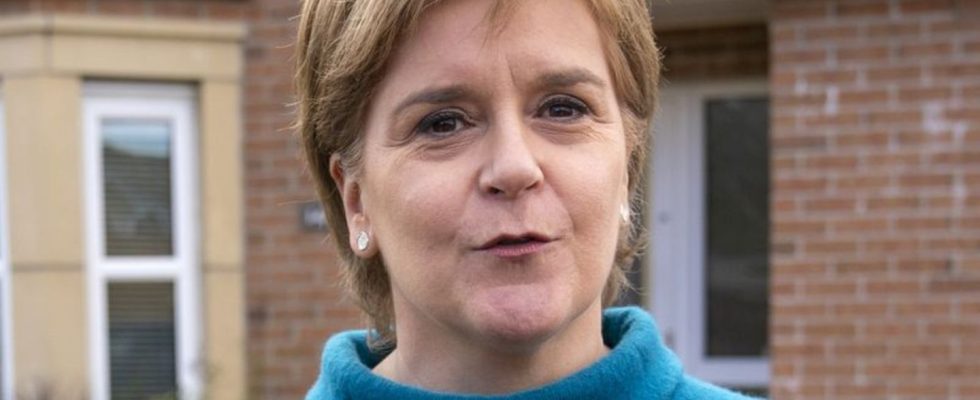The Sturgeon case
Is Scotland’s independence movement over?
Nicola Sturgeon surprisingly announced her resignation from the party leadership in mid-February. photo
© Jane Barlow/PA Wire/dpa/Archive
Nicola Sturgeon is considered the face of the Scottish independence campaign. But since the long-time head of government resigned, her party has descended into chaos.
For a long time, her path led straight up. But after the temporary arrest of ex-Prime Minister Nicola Sturgeon, the Scottish National Party (SNP), often described as invincible, finds itself in the biggest crisis in decades – and the desire for independence from Great Britain has received more than a severe damper.
The SNP is at a “tipping point,” said Gerry Hassan of Caledonian University in Glasgow to the Financial Times newspaper. Demands came from within Sturgeon’s own ranks that her SNP membership should be suspended – or that her successor, Humza Yousaf, should be suspended. But the prime minister refused. There is no reason because Sturgeon was released without charge, he told the BBC.
The polls are in free fall, the financial situation is chaotic, numerous members are gone – the pressure on Yousaf is increasing. Choosing Sturgeon’s confidante as her successor was seen as a sign of continuity. Now the 38-year-old has to clean up above all.
We’re talking about a “soap opera”
Before Sturgeon, who continues to sit in the Edinburgh regional parliament, her husband Peter Murrell, who has long held a central SNP office, and Treasurer Colin Beattie were questioned by police for hours. In the case, which has long since become a Sturgeon case, it seems almost grotesque that the police also confiscated a luxury campervan. There is talk of a “soap opera”. Rumor has it that hundreds of thousands of pounds of donations to the independence campaign have been misappropriated. “Regardless of whether or not Ms Sturgeon is charged, this scandal has already ruined the SNP’s reputation,” the Mail newspaper commented.
In a good eight years at the top, Sturgeon, who vehemently denies the allegations, and Murrell had shaped the party into an election-winning machine. In the most recent regional elections, the SNP gained ground and missed an absolute majority by a hair’s breadth. Together with the Greens, who are also aiming to return to the EU, the party had a clear majority in Parliament in Edinburgh.
But observers are now criticizing that the SNP was tailored too much to the “power couple” at the top. Internationally, Sturgeon was valued as the mother of the country, internally she led with a firm hand. Opponents like predecessor Alex Salmond were ousted. “Nicola Sturgeon has suspended others from the SNP for a lot less,” said Angus MacNeil, the party’s MP. Only a few people were involved in the decisions, it can now be read. When things got critical, Sturgeon distracted them with loud demands that the British government finally agree to a new independence referendum.
Detachment from London has been the dominant issue in Scotland for years. With its clear course for independence, Sturgeon has sharpened the profile of the SNP – at the expense of the Labor party, which governed Scotland for a long time and largely represented the same positions. Only Labor is against secession, and the SNP took advantage of that.
Labor is catching up in polls
Since Sturgeon’s completely surprising resignation announcement in February, however, the weight has shifted. Labor is catching up in polls. This should also have consequences for the upcoming British parliamentary elections, which are expected to take place in autumn 2024. 59 seats for London will be allocated in Scotland. Most recently, Labor got just one, but the SNP 48. If Labor can wrestle a few constituencies from the National Party, this would give opposition leader Keir Starmer a significant tailwind on the way to Downing Street. No Labor leader has become prime minister without votes from Scotland.
Labor is clearly in the lead in the national polls, helped by the situation within Prime Minister Rishi Sunak’s Conservative Party. The Tories are shaken by the dispute over ex-Prime Minister Boris Johnson, who gave up his parliamentary seat on Friday over serious allegations in the “Partygate” affair about illegal lockdown celebrations. “Keir Starmer has had worse weeks,” commented journalist Lewis Goodall. “Starmer sees his two biggest opponents implode.”
But for many Scots, detachment from London remains a goal even without Sturgeon. Polls see losses for the SNP – but when it comes to independence, the northernmost part of Britain remains divided. Labor is warned. The independence issue is shaping votes in a way that is difficult for the other parties, a senior Labor source was quoted by the Financial Times as saying.

